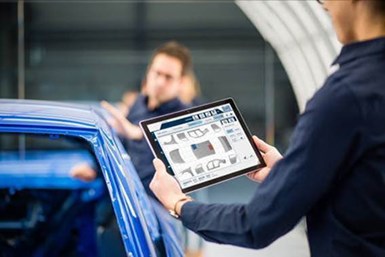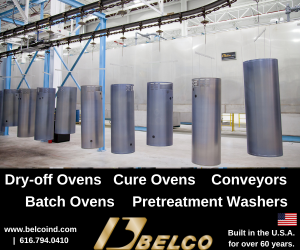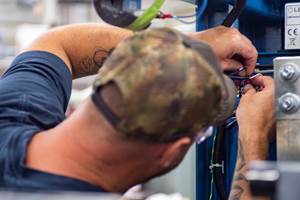Embracing the Future of Finishing
Products Finishing editor-in-chief Scott Francis discusses the challenges and the changing landscape of the finishing industry — and how new technologies might carry the industry forward.

Dürr’s smart painting line, developed for SAIC Volkswagen, records around 3,500 digital data points for every individual body alone.
Photo Credit: Dürr
So many of the conversations that I have on a day-to-day basis center around what the future might hold for the surface finishing industry. While the winds of change are always a factor, the past year seems to have brought many challenges to the surface that seem to indicate some real shifts on the horizon for the manufacturing world — and for coaters and finishers. Currently, many in the industry are struggling with supply chain issues caused by raw material shortages and shipping disruptions due to the aftermath of COVID, winter storms and fuel disruptions, among other factors. Many finishing operations are understaffed and have difficulty finding skilled and reliable workers. New regulations are forcing finishing operations to reevaluate their processes, implement new solutions and consider some fundamental changes. New applications such as electric vehicles and urban mobility are bringing with them the need for new coating solutions. In short, all of this means new ways of doing things.
Industry 4.0, automation and smart technologies have been on the mind of everyone in manufacturing for the past few years. Yet, the COVID pandemic brought with it an urgent need to make the most of online technology. Quarantine imposed a new way of working on everyone and brought many of us to a whole new comfort level with apps and smart devices.
Whether fairly or unfairly, the surface finishing industries are often perceived as late adopters of new technologies. But that too seems to be starting to change. A quick look through finishing related news paints a picture of an industry that is changing with the times. Axalta recently rebranded its Transportation Coatings business unit to Axalta Mobility Coatings to put focus on the evolving coating needs for e-mobility. Durr recently deployed a digitized paint shop for SAIC Volkswagen. Porsche is robotically installing patches to seal paint access holes, eliminating the manual labor previously used to install plastic plugs. The University of Nottingham recently received funding to use AI to develop new aerospace ceramic coatings.
The ways in which new technologies are shaping the future of manufacturing are vast, ranging from improving the quoting process to shop floor automations to material and product tracking to R&D. In this issue we look at a couple of examples from different processes used to finish parts.
Recently, Tawas Plating Company (Tawas City, Mich.) used automation of electroless nickel baths to improve production rates, material consumption and consistency in the plating deposit finish, as well as to reduce waste. The company selected an online spectrophotometric nickel/pH controller from Walchem - IWAKI America Inc. (Holliston, Mass.) that provides integrated data handling, connectivity and remote accessibility.
We also look at a new abrasive process solutions lab created by Norton | Saint-Gobain (Worcester, Mass.) geared at helping finishers develop automated abrasive process solutions to address their mechanical finishing needs.
Too often, finishing seems to almost be an afterthought in the manufacturing process for parts or products. At the same time, a part’s final finish provides protection and is the first thing the end user interacts with on any given product. Considering the finishing of a part at a late point in its process timeline can cause plenty of problems in the production schedule. Taking a look at ways that smart technologies, new software and automation can streamline not only finishing processes, but the ways that manufacturers and finishers work together is a topic of utmost importance.
In the June installment of Products Finishing’s On the Line podcast we’ll delve into that exact problem. Jason Ray, co-founder and CEO of Paperless Parts, will discuss how the company’s quoting software seeks to bridge the communication gap between manufacturers and finishers, helping to streamline the overarching process of producing parts. The episode will launch in mid-June — visit pfonline.com/podcast to stream episodes or subscribe.
It’s almost an understatement to say that business is challenging for finishers and the whole of manufacturing right now. The conversations currently taking place among those in the surface finishing industry delve deep into myriad problems that the community is facing. However, such discussions don’t necessarily fill me with a sense of foreboding. Instead, when I talk with some of the talented professionals in our industry and listen to the smart ideas that are being bounced around, I’m confident that the surface finishing community will rise to these challenges and help carry manufacturing into an exciting future.
Related Content
Steelhead Technologies Wins Top Performer Award
Steelhead Technologies has receved the Winter 2024 Top Performer award in job shop software from software comparison website SourceForge.
Read MoreERP Provider Demonstrates Streamlined Installation
Steelhead Technologies claims 36-hour ERP deployment sets new industry standard.
Read MoreUnlock Unparallelled Reliability
By prioritizing reliability in every aspect of its service offerings Dynapower ensures your equipment operates at peak performance levels consistently. With a steadfast focus on reliability, Dynapower’s field service, preventative maintenance and spare parts solutions ensure uninterrupted operations, minimizing scrap and maximizing uptime.
Read MoreAI Tool Optimizes, Automates Powder Coating
New “digital Blueprint” technology fine-tunes every aspect of a powder coating system. The platform promises at least 10% powder savings, a return on investment of a few days and an increase in uptime.
Read MoreRead Next
A ‘Clean’ Agenda Offers Unique Presentations in Chicago
The 2024 Parts Cleaning Conference, co-located with the International Manufacturing Technology Show, includes presentations by several speakers who are new to the conference and topics that have not been covered in past editions of this event.
Read MoreDelivering Increased Benefits to Greenhouse Films
Baystar's Borstar technology is helping customers deliver better, more reliable production methods to greenhouse agriculture.
Read MoreEpisode 45: An Interview with Chandler Mancuso, MacDermid Envio Solutions
Chandler Mancuso, technical director with MacDermid Envio discusses updating your wastewater treatment system and implementing materials recycling solutions to increase efficiencies, control costs and reduce environmental impact.
Read More






















